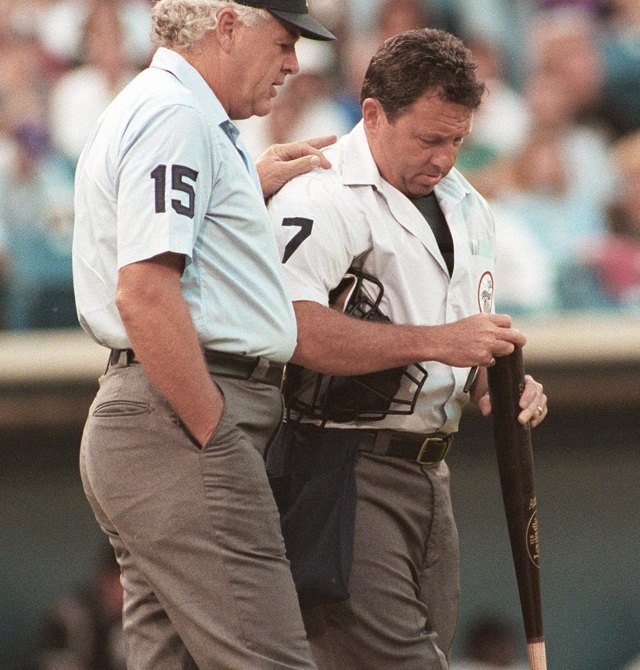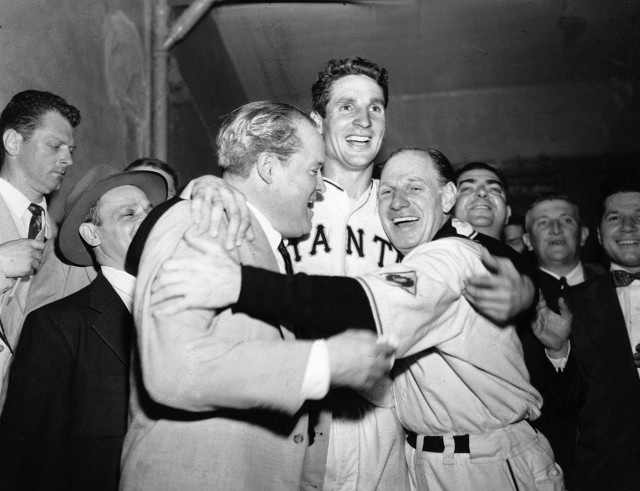Give Michael Pineda of the New York Yankees credit for this much: He cheated the old-fashioned way.
The nervy Pineda was caught Wednesday night
with an obvious smear of sticky pine tar on his neck — meant, he said,
to get a better grip on the ball on a cold night in Boston. It was
Pineda’s second offense in the first month of the season.
So, hey, who needs
steroids? Creative ways to cheat are as old as the game itself. Here are
five examples — some simply slippery, others more elaborate, and at
least one that reads like something out of “Mission: Impossible.”
Master of the Spitball
Gaylord
Perry was well-known for slicking up the ball to make it dive and curl.
You name it, he used it: Vaseline, hair tonic, his own spit.
His reputation was so established that Perry used it to mess with hitters’ minds.
Before
every pitch, even the legal ones, he went through such a series of
contortions —running his fingers along the inside of his cap, behind his
ears, down his sleeves — that he looked more like a sleight-of-hand
magician or a mime than a pitcher.
Gene
Mauch, the legendary manager, once said of Perry that if he was ever
elected to the Hall of Fame, he should be enshrined “with a tube of K-Y
jelly attached to his plaque.”
Perry got the last laugh. He won 314 games — and did indeed go to Cooperstown.
The Corked Bat Caper
The
irascible Cleveland Indians slugger Albert Belle had his bat
confiscated on July 15, 1994, when the manager of the Chicago White Sox
raised the possibility that it was corked.
Corking
a bat — hollowing out the business end and replacing the wood with
material like cork or even ground-up superballs — makes the bat lighter
and thus the hitter’s swing quicker.
The accepted wisdom that it helps the ball travel farther has been questioned by physics experts.
But no matter: What happened next in that 1994 game is what elevates
the Belle story from time-honored cheating to slapstick hilarity.

MARK MORENCY / AP file
The bat in question went to the umpires’ room. Then one of Belle’s teammates, pitcher Jason Grimsley, wriggled through an air duct, dropped down from the ceiling, took the Belle bat and replaced it with a legal one.
This
was not exactly James Bond-level spycraft. The replacement bat had
another player’s name on it. Belle served a seven-game suspension.
The Even More Famous Pine Tar Episode
Say
the words “pine tar” or the name “George Brett” to baseball fans, and
they think of the greatest thermonuclear meltdown in the history of the
game.
On July 24, 1983, with his
Kansas City Royals down 4-3 to the New York Yankees with two men out in
the ninth inning, Brett hit a home run against Goose Gossage, putting
the Royals ahead 5-4.
Billy
Martin, the Yankees manager, who elevated paranoia to an art form,
called for an inspection of the bat. Using home plate as a ruler, the
home plate umpire, Tim McClelland, found that Brett had pine tar too far
up the handle.
Pine tar helps hitters grip the bat, and Rule 1.10(c) specifies that it can’t go farther up the bat than 18 inches. Brett was called out. Final score: Yankees 4, Royals 3.
The memorable part came next: Brett charged out of the dugout in a vein-popping, expletive-peppered, arm-flailing fit of rage.
But
Brett had been busted on a technicality. The reason for the 18-inch
rule wasn’t an unfair advantage for the hitter — it was that pine tar
was getting on too many batted balls and ruining them.
The
Royals filed a protest, and the American League president found that
Brett had violated the letter, but not the spirit, of the law. He
reinstated the home run and ordered Brett ejected for the outburst.
The
game was resumed 25 days later. The Yankees offered free admission to
anyone who was there the first game. They went quietly in the bottom of
the ninth. Final score: Royals 5, Yankees 4.
Where Did That Come From?
On
Aug. 3, 1987, Joe Niekro was on the mound for the Minnesota Twins and
threw a slider that knifed through the air so fiercely that it looked
suspicious to the home plate umpire, Tim Tschida.
He went out to the mound and ordered Niekro to empty his pockets. Niekro turned them inside out. As he raised his arms — nothing to see here — a small object fluttered out and fell to the ground.
It
was an emery board, perfect for scuffing a ball and changing its
aerodynamics. Niekro had a plausible explanation: He threw a
knuckleball, and knuckleballers need to keep their nails precisely
manicured to throw the pitch with precision.
Nobody
bought it. In any event, Niekro was found to have sandpaper, too. He
wasn’t running a nail salon. The league president suspended him for 10
games. Niekro got a gig on Letterman out of it.
“The guy was so blatant,” second base umpire Steve Palermo told Sports Illustrated at the time, “it was like a guy walking down the street carrying a bottle of booze during Prohibition.”
Grand Theft
The 1951 New York
Giants have a special place in baseball history: They won the deciding
game of a playoff against the Brooklyn Dodgers on a walkoff home run by
Bobby Thomson.
It is known as
the Shot Heard ’Round the World and is arguably the greatest home run in
history. But there was more to the story.
Fifty years later, Joshua Prager, a reporter for the Wall Street Journal, uncovered an elaborate scheme:
The
Giants had set up a telescope in the clubhouse beyond center field and
stationed a coach there to intercept the signs flashed by the opposing
catcher to signal what the next pitch would be.
An
electrician set up a buzzer, enabling the Giants to relay the signs to
the bullpen — one buzz for a fastball, say — and from there they could
be relayed to the hitter. The relay code was as simple as crossed or
uncrossed legs.
Prager detailed the scheme in a 2006 book, “The Echoing Green.”

AP
It is impossible to know how much the trick helped the Giants erase a 13-game deficit that summer and pull even with the Dodgers, setting up the playoffs. As for Thomson and his home run: Did he know what pitch was coming?
“I’d
have to say more no than yes,” Thomson mysteriously told The Journal in
2001. “I don’t like to think of something taking away from it.”
--------------------
but don't forget sammy sosa with his corked bat:
--------------------
but don't forget sammy sosa with his corked bat:


No hay comentarios:
Publicar un comentario